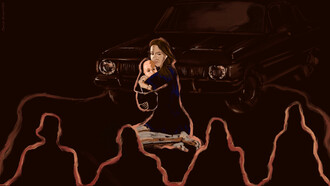There is not a more miserable species than humans, believes the Rumanian philosopher and writer, Emil Cioran. The existentialist thinker argues that men fail to realise that there is no real meaning to existence. An individual blinded by their ideals and beliefs is nothing more than one denying the inevitable: death.
The philosopher believes that from the moment of their birth to the day they die, men participate in a race to avoid the unavoidable. In an attempt to forget their reality, men create convictions and values that lead them to form communities. Their fear of death results in a constant and “ridiculous” urge to find meaning in life. This is how Cioran explains humanity’s need for religion, society, and nationalism; being part of something or believing in a “greater plan” gives men answers before they even have to ask the questions.
Arguably inspired by antique nihilism and medieval philosophers, Cioran claims that men’s vanity and insatiable necessity to share their beliefs and create community is the sole reason why humanity has never given up. Despite this sounding a lot like a sociological and anthropological analysis of civilisations, the philosopher does not consider it to be a positive aspect of humanity but a characteristic that stalls and blinds them from the truth. He believes that if men were truly aware that the only real thing in life is death, they would cease their search for a “master plan” or “reason of existence” and instead, rush to their ends. “Not being born is undoubtedly the best plan of all. Unfortunately, it is within no one's reach.” Cioran romanticises death as the bravest and most meaningful decision a man can make.
When I stumbled upon Cioran’s essays I was mostly intrigued by his views on humanity’s need for society, which I find are inherently true. However, I do not believe that the fact that there is no meaning to life directly results in death being the better option. In fact, Emil lived until the age of 84, so even he could not have truly believed what he preached.
I consider that when a man does not measure up to his beliefs, his credibility inevitably falters and that is what I thought when I read Cioran. The philosopher loathed and condemned fame and vanity, yet his need to express his thoughts led him to publish over 15 books and essays. Therefore, is it hypocritical to believe and push towards something yet live a different reality? If so, aren’t most philosophers hypocrites?
What I mean by this is: can a man fight against corruption, injustice, and inequality but live in a fancy big flat and own a nice car? Can the church fight poverty yet live in extreme wealth? Where should we draw the line? If I am against social injustice and believe that there is a lack of opportunity in the lower class, should I be empathetic, create visibility and help with what I can? Or should I give up all material things to be fair? Does my privilege make me a hypocrite? Was Cioran a hypocrite for preaching to death yet living a long life? Or was Cioran’s pessimism actually just an act of human cowardice where he ended up falling into what he most despised? In the end, don’t we all do that?















